A Comprehensive Guide to Pet Birds in Australia
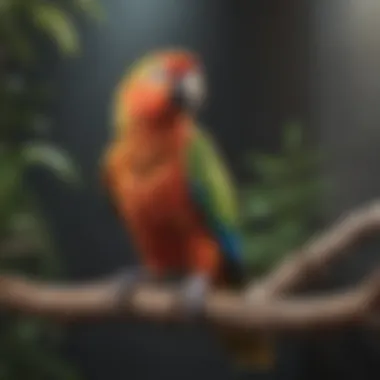
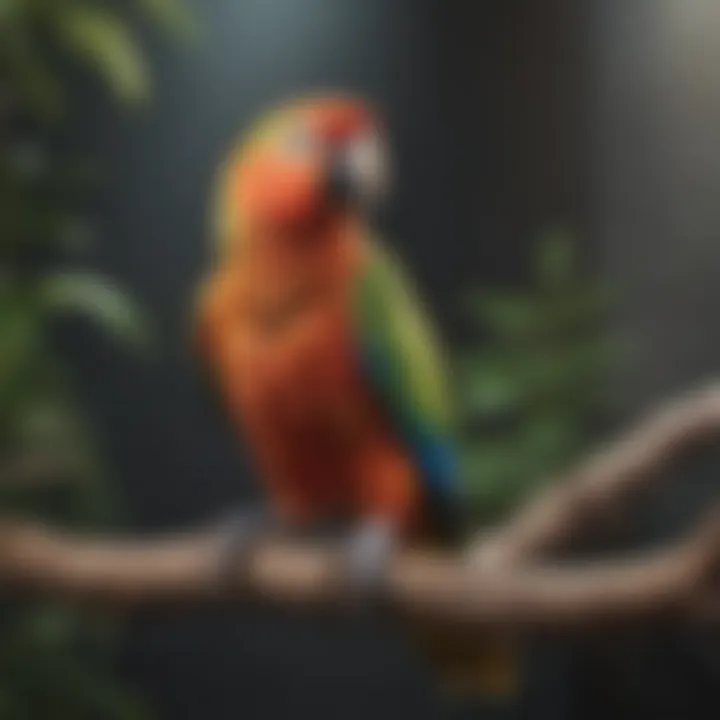
Intro
Birds have captured the imagination of countless pet enthusiasts, offering companionship and joy in unique ways. In Australia, a rich avian culture thrives with a diverse selection of pet bird species. From vibrant cockatoos to lively budgerigars, these creatures bring color and life to homes across the continent. But diving into the world of pet birds requires understanding not just their appealing looks, but also their needs and behaviors.
As you embark on this journey to explore popular pet birds in Australia, this guide aims to unravel the essential aspects of their care, behavior, and emotional well-being. The following sections will delve into various themes, providing a detailed look into the intricate relationship between human and bird. You will see the importance of proper nutrition, effective interaction, and the significance of emotional health among birds. The aim is to equip you with knowledge that empowers responsible pet ownership and enhances the bond you share with your feathered friends.
Avian Care Basics
Caring for a pet bird involves several essential components that promote their health and happiness. A well-rounded approach ensures that your pet can thrive in a domestic setting, embodying both vitality and temperament that would make any owner proud.
Importance of Proper Nutrition
Feeding your bird the right mix of nutrients can make all the difference in their lifespan and overall health. Different species require different diets; for instance, cockatiels benefit from a diet rich in grains, while parakeets thrive on seeds, fruits, and vegetables.
"A bird’s diet is its lifeline; what you feed them can define their days in your care."
Understanding what your specific pet requires is crucial. Research any dietary needs, and consider incorporating a mix of seeds, pellets, and fresh foods. Supplements may also be needed for extra nutrition, especially in breeding or molting seasons.
Understanding Bird Species and Their Needs
Each bird species displays distinct behaviors and requirements that must be respected to ensure their well-being. While some birds, like finches, may thrive in smaller cages and prefer a quieter environment, others, like eclectus parrots, desire ample space and social interaction. Observing their behavior can provide insight into their needs.
Basics of Birds Habitat Setup
Creating a suitable habitat is pivotal for your bird’s comfort. A properly outfitted cage can greatly influence their mood and health. Start with an appropriately sized cage for your bird species. Include various perches at differing heights, toys for stimulation, and secure hiding spaces for your feathered friend to retreat when they need a break.
When you set up their space, make sure it has enough light, as natural sunlight can boost their general well-being. Avoid placing the cage in high-activity areas of your home, where excessive noise and movement can cause stress.
Grooming and Hygiene Tips
Birds require regular grooming to maintain their feathers and skin in good shape. Nail trimming is another important aspect of grooming. Ensuring your bird's living space is clean is equally important; regular cage cleaning prevents diseases. Pay attention to any unusual behaviors that might indicate discomfort or health issues.
Interacting with Your Pet Bird
Interactions are not just fun— they are vital for your pet bird's emotional and mental health. Building a relationship with your bird encourages trust and helps them feel secure in their environment.
Building Trust and Connection
Establishing a bond often starts with patience. Spending time near the cage can help your bird get used to your presence. Speak softly and avoid sudden movements to create a relaxed atmosphere. Offering treats can also help build trust; many birds have favorite snacks that can be used to reinforce positive interactions.
Training Techniques and Tips
Training may seem daunting, but it can be a rewarding process. Use positive reinforcement techniques, like clicker training, to encourage desirable behaviors. Simple commands can lead to impressive tricks over time, providing mental stimulation for your bird.
Fun Activities for Bird Owners and Their Birds
Activities like playtime outside the cage, flight training, or introducing new toys can help nurture a lively relationship. Consider setting up a play area with various interactive toys that will keep your bird entertained and engaged.
Recognizing Bird Cues and Behaviors
Being attuned to your bird's behavior is crucial. Understanding what their movements and sounds mean can help foster better interactions and improve your bird's quality of life. Watch for their body language; fluffed feathers might indicate they’re cold, while bobbing heads can signal excitement.
Emotional Well-Being of Birds
The emotional health of your pet bird is largely tied to its environment and interaction with you. Recognizing what contributes to their happiness will improve your bird's quality of life significantly.
The Role of Play and Socialization
Just like kids, birds need playtime and social interaction. Engage in activities that stimulate them mentally and physically. Socialization is essential, both with you and other birds. Consider introducing your pet to other avian companions if social interaction is something it lacks.
Enhancing Birds' Emotional Health
Offering variety in their daily routine can greatly enhance their emotional well-being. Change their toys regularly, rotate the location of their cage, and introduce new experiences to keep them stimulated.
Assessing Bird Stress and Remedies
Birds can be prone to stress from various factors. Signs of stress include excessive feather plucking, aggressive behavior, or lethargy. Identifying stressors in their environment is key to resolving these issues and keeping your pet happy. Creating a safe and comfortable habitat will go a long way toward preventing anxiety.
Building Strong Human-Bird Bonds
The more time you invest in understanding your bird, the stronger the bond you’ll create. Engaging in daily care routines, talking to your bird, and setting aside time for play will reinforce trust and affection.
Bird Health and Safety
A healthy bird is a happy bird, and paying attention to their health can prevent problems down the line. Recognizing symptoms and maintaining routine care is essential in keeping them lively and thriving.
Common Health Issues and Prevention
Many birds face common health issues, such as obesity and respiratory problems. Keeping an eye on their weight, ensuring a balanced diet, and maintaining clean air in your home can help mitigate these issues.
Routine Veterinary Care
Regular check-ups with an avian vet are crucial, even if your bird appears healthy. Vet visits can catch potential issues early and provide vaccination if necessary.
Environmental Hazards to Avoid
Be aware of environmental hazards that could affect your bird. Items like Teflon cookware and certain indoor plants can be toxic. Also, avoid exposing your bird to secondhand smoke and excessive household chemicals.
Signs of Illness or Distress
Recognizing early signs of illness can save your bird’s life. Common signs to watch for include changes in appetite, lethargy, and changes in droppings. If you notice any concerning behaviors, consult an avian vet promptly.
Fun Facts and Quirky Insights

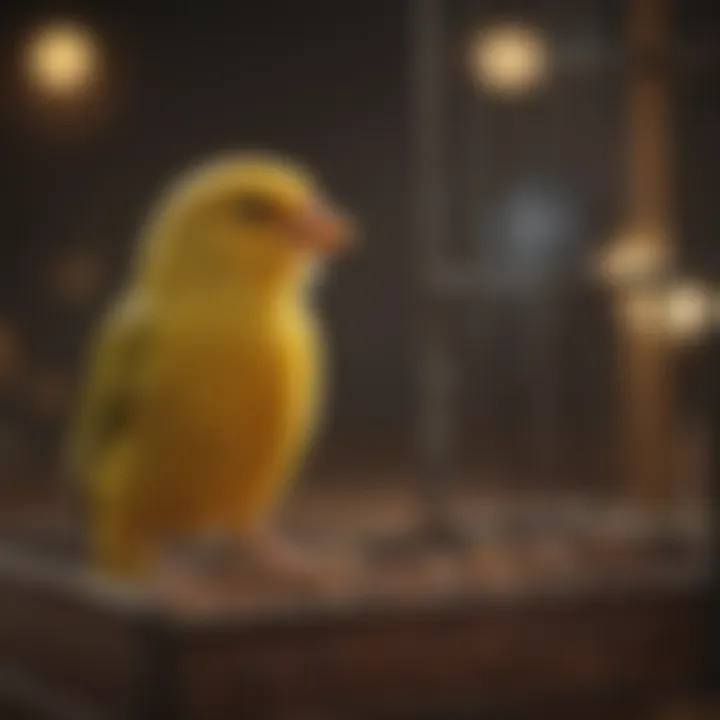
Every bird has its charm, and learning unique traits can deepen your appreciation for them.
Unique Traits of Popular Bird Species
Bird species display a multitude of interesting traits. For instance, cockatoos are known for their ability to mimic speech while lovebirds are often characterized by their affectionate behaviors.
Historical and Cultural Significance of Birds
Birds play significant roles in various cultures and histories, symbolizing freedom in many societies. In Australian Aboriginal cultures, birds often feature in stories and lore, illustrating their deep-rooted connection to the land.
Famous Bird Owners and Their Stories
The relationship between humans and birds can often lead to fascinating stories. Some famous personalities, like singer and songwriter Paul McCartney, have been known to foster strong bonds with their pet birds, creating lasting memories and connections that inspire others.
This guide has uncovered the essential relationship between pet birds and their owners, shedding light on their needs and behaviors. By fostering both knowledge and compassion, you can create an enriching life for your avian companion, making the journey together all the more worthwhile.
Prelude to Pet Birds in Australia
Birds have been companions to humans for a long time, enriching lives with their presence and songs. In Australia, pet birds have carved a significant niche, bringing joy and entertainment to countless households. This introduction aims to illuminate the vibrant role that pet birds play within Australian culture and society.
With a unique blend of colorful species native to the continent and the popularity of diverse breeds, pet bird ownership in Australia is more than just a hobby. It's a passion that speaks to a deeper connection between man and nature. Many people find solace and companionship in the chirps and whistles of their feathered friends. Exotic and native birds such as cockatiels, budgerigars, and conures add color, liveliness, and a sense of responsibility to a home. Moreover, owning a bird can foster a sense of community among bird breeders and enthusiasts alike, leading to shared experiences and knowledge.
When considering a bird as a companion animal, potential owners should be aware of their unique traits, both in terms of behavior and care requirements. Birds are not just decorative; they are sentient beings with specific social and emotional needs. Understanding the nuances behind keeping pet birds in Australia can lead to more rewarding relationships and better welfare for the birds themselves.
Furthermore, exploring the importance of pet birds in Australia sets the stage for the detailed insights that follow. From their captivating characteristics to their care, we will unravel the essentials that every aspiring bird owner should know.
Most Popular Pet Bird Species in Australia
When diving into the world of pet birds, it’s essential to identify the most popular species in Australia. This helps both new and experienced bird lovers understand what types of birds often become cherished companions. Each species carries its unique appeal, bringing various traits, care requirements, and social behaviors into the fold. By focusing on well-known birds, potential owners can assess which pet would best fit their lifestyle and home environment. Moreover, understanding these species aids in fostering a supportive community that encourages responsible ownership and animal welfare.
Cockatiels
Characteristics and Traits
Cockatiels are renowned for their charming personalities and striking crests. What sets them apart is their friendly demeanor coupled with a level of intelligence that makes them quite trainable. Their vibrant plumage, which can vary from grey to different shades of yellow and orange, captures the attention of many bird enthusiasts. This unique combination of color and character paints them as a popular choice among pet owners.
Additionally, they are known to form strong bonds with their caregivers, which deepens their overall appeal as a pet. Having a cockatiel means having a companion that is both lively and affectionate, creating a warm atmosphere in any home.
Care Requirements
In terms of care, cockatiels require a balanced diet of seeds, pellets, and fresh fruits or vegetables. They need a spacious cage equipped with perches and toys that can stimulate their curiosity. Unlike some larger bird species, cockatiels are not overly demanding, making them a manageable choice for first-time bird owners.
Also, keeping their habitat clean is crucial for their health. Regular cage cleaning and providing fresh water daily can help sustain their lively spirits. Drawing a line between indulgent pampering and necessary care can be a fine balance for new bird parents, yet it appears that cockatiels generally thrive with basic yet consistent attention.
Social Behavior
Cockatiels are social creatures. They often enjoy interaction with humans and other birds. Their playful antics and ability to mimic sounds can keep the atmosphere light and joyful. An interesting aspect of their social behavior is their tendency to sing; male cockatiels are particularly vocal, often showcasing a range from simple whistles to more complex tunes.
However, potential owners should heed a warning: neglecting their social needs can lead to boredom or stress, which may manifest in undesirable behaviors. Thus, regular engagement and stimulation play a significant role in enhancing their quality of life.
Budgerigars
Physical Attributes
Budgerigars, affectionately known as budgies, are small, vibrant parrots. Their colorful feathers often exhibit shades of green, blue, and yellow. This trait alone makes them visually appealing pets. Budgies, despite their small size, show off a big personality that can make anyone smile.
Their petite stature means they require less space than larger birds, making them a convenient option for those with limited living space. However, their small size should not downplay their energetic nature, which can fill a room with life and laughter.
Training and Interaction
One of the most commendable features of budgerigars is their trainability. They respond well to positive reinforcement, making training a rewarding experience. Teaching them simple commands or tricks fosters a bond, allowing owners to engage more meaningfully with their pets. Just like humans, budgies enjoy interactive play, which can enhance their social development.
The hands-on approach required in their training serves as an essential bridge between owners and their budgies, nurturing trust and affection. This direct method, however, needs patience, as each bird learns at its own pace.
Nutritional Needs
Catering to a budgie’s nutritional needs involves providing a balanced diet rich in seeds and fortified pellets. Fresh fruits and vegetables can also add variety and benefit their health. However, it’s crucial to avoid certain foods like avocados and chocolate, which can be toxic.
Maintaining this diet strikes an equilibrium between ensuring their well-being and enjoying a variety of delightful interactions during feeding times. Plus, regular hydration is vital; providing fresh, clean water should be a priority for all bird owners.
Lovebirds
Species Overview
Lovebirds are small parrots known for their affectionate nature and strong pair bonds. Typically, they come in various colors and varieties, each showcasing unique shades. Their social structure heavily relies on interactions with their partners, whether that be another lovebird or their human caregiver.
Known for their playful spirit and engaging personalities, lovebirds make enchanting companions. They require both social stimulation and physical activity, making them lively members of any household.
Bonding Patterns
Interestingly, lovebirds are among the most loyal of bird species. They thrive on companionship and often exhibit a deep bond towards their partners. This commitment often means that they should ideally be kept in pairs, as they provide each other with essential social needs, thereby minimizing stress.
Observing a pair of lovebirds engaging in playful antics is a testament to their bonding, providing endless joy for their owners. However, individuals should be aware that keeping solitary lovebirds may lead to anxious behaviors, so a companion is often the best choice.
Health Considerations
While lovebirds have a reputation for resilience, they are not without health concerns. Common ailments include feather plucking or respiratory infections, often stemming from stress or improper living conditions. Regular veterinary check-ups are essential to confirm their health status and maintain early detection of any potential issues.
Moreover, providing an environment that mimics their natural habitat can assist in keeping them healthy and happy.
Conures
Diverse Varieties
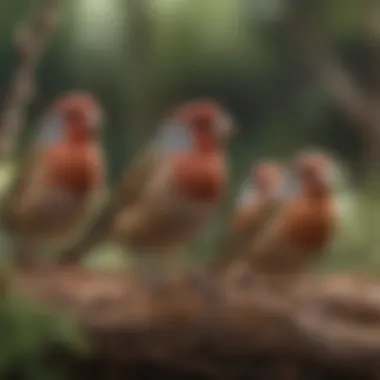
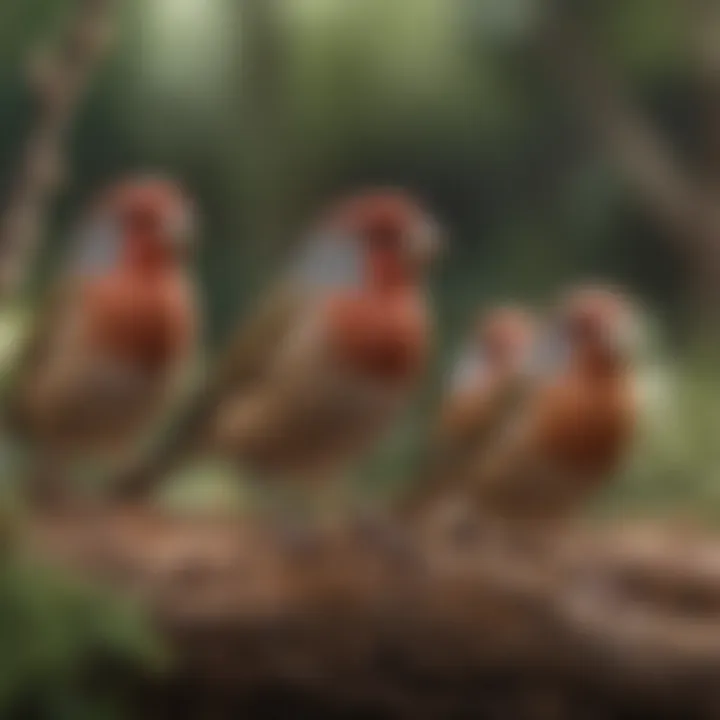
Conures are an exciting group of birds, characterized by their wide range of colors, sizes, and personalities. Each species carries distinctive traits, making them particularly appealing to pet owners with varying preferences. Some popular types include the Sun Conure and the Green-cheeked Conure, each boasting vibrant plumage and engaging behaviors.
Their diversity not only shows in physical characteristics but also in temperament; while some may be calm and cuddly, others can be quite boisterous. This variance allows future bird owners to find a conure that fits well with their lifestyle and expectations.
Noisy Nature
Conures are known for their vocalizations, which can be both a charm and a challenge. Their natural tendency to be loud might become a consideration for potential owners, especially those in apartment settings. They use their voices to communicate, but it’s important to note that each species has its own level of vocalization.
While the joyful sounds can add a lively touch to daily routines, some owners may need to set boundaries to manage noise levels, particularly if living in close quarters.
Social Engagement
Finally, conures are incredibly social birds that thrive on interaction. They love to play and engage in activities with their owners, often requiring sufficient interaction daily to maintain happiness. This lively nature can lead to strong bonds between conures and their caregivers. However, individuals need to ensure they provide ample stimulation to avoid behaviors associated with boredom, which some might see as troublesome.
African Grey Parrots
Intelligence and Vocal Abilities
African Grey Parrots are celebrated for their intelligence and exceptional vocal skills. They are capable of mimicking human speech and sounds with astonishing clarity, leading to a captivating bond with their owners.
What stands out about them is not just their ability to mimic but also their capacity to understand context. This unique trait elevates them from simply being pets to engaging companions who can partake in conversations, thereby enriching the human-bird dynamic.
Enrichment Activities
To keep their keen minds stimulated, African Greys require various enrichment activities. Puzzles, toys, and interactive play can help channel their intelligence constructively. Owners should keep a rotating selection of toys to prevent monotony and encourage exploration.
When their mental chemistry is engaged, it results in happy, well-adjusted birds that showcase their brilliance.
Common Health Issues
Like other species, African Grey Parrots can face health challenges. Common conditions include obesity, feather plucking, and respiratory issues. A balanced diet and regular vet check-ups become prescriptive for their long-term health.
Owning an African Grey mandates attentiveness to their emotional and physical well-being, ensuring they flourish in a loving environment.
Caring for Your Pet Bird
Caring for a pet bird is not just a hobby; it's a commitment that requires understanding, compassion, and a good bit of knowledge. Unlike the common misconception that birds are low-maintenance pets, providing appropriate care goes a long way in ensuring their happiness and health. Bird owners can gain a deeper bond with their feathered companions when they comprehend their specific needs, from warmth and shelter to food and social interaction.
Habitat and Environment
Proper Cage Setup
A properly set up cage acts as your bird’s sanctuary, giving them a safe space to relax and explore. Safety and comfort are key characteristics in a good cage design. The perfect cage should allow ample room for your bird to stretch their wings and avoid boredom. A spacious environment is beneficial, reducing stress and promoting healthy behaviors.
Additionally, a unique feature of an ideal cage setup is its accessibility. Birds should be able to move in and out comfortably without any hindrance. However, it’s essential to watch out for cages made from toxic materials which could harm your pet. Ensure the structure is sturdy to withstand the lively antics of your pet.
Toys and Enrichment
Engaging your bird with toys and enrichment activities is vital for their mental health. A diverse array of toys fosters play, helping to align their natural instincts. Birds explore their environment by chewing, climbing, and manipulating objects, which keeps them engaged and prevents issues stemming from boredom.
Incorporating natural materials into toys can enhance their experience. For instance, wooden toys that can be shredded not only entertain but also satisfy their need to chew. However, it’s important to monitor the toy's condition to avoid any risks associated with broken parts.
Temperature Regulation
Keeping your pet bird comfortable means understanding their preferences regarding temperature. Birds thrive in stable temperatures; too hot or too cold can lead to health problems. A unique facet of temperature management involves monitoring their exposure to drafty areas or direct sunlight.
To keep the environment comfortable, consider investing in a thermometer inside the cage to ensure the temperature falls within an ideal range for the species you own. Birds appreciate warmth, especially during colder months. Just remember to consider their natural habitat when setting temperature guidelines.
Nutrition and Diet
Balanced Diet Essentials
A balanced diet forms the backbone of a bird’s health and longevity. The essence of a balanced diet lies in variety, as pet birds require a mixture of seeds, pellets, fresh fruits, and vegetables. A well-rounded diet prevents deficiencies and keeps them lively.
Offering a range of foods not only meets their nutritional requirements but also simulates foraging behavior. However, be cautious with the proportions; too many seeds can be detrimental due to high-fat content. It’s about creating a harmonious diet that contributes to your bird’s wellness.
Treats and Supplements
Treats can serve as rewarding incentives for training or as a way of bonding with your bird. Incorporating healthy treats like nuts or dried fruits adds beneficial nutrients to their diet. However, moderation is crucial as too many can lead to weight-related issues.
Supplements can also play a role in maintaining nutrient levels, especially if your bird is a picky eater. Using a quality supplement that provides essential vitamins may prevent deficiencies, but it’s wise to consult an avian veterinarian before adding them into the mix.
Water Quality
Fresh and clean water is another cornerstone of any pet bird's diet. The quality of water provided should not be overlooked, as contaminants can lead to health problems. Regularly changing their water ensures they have access to clean drinking sources.
Additionally, consider providing them with filtered water or even offering them fresh fruits that have high water content. This not only boosts hydration but can also be a fun way for birds to take in fluids.
Health and Wellbeing
Routine Checkups
Regular veterinary checkups are an essential part of owning a bird. These routine examinations help you catch any potential health issues early on. The key characteristic of these checkups resides in the peace of mind they provide. It’s a preventive approach to bird care that keeps your feathered friend healthy and happy.
Aside from physical health, these visits are opportunities to discuss behavior and diet with professionals who understand avian needs. They can also provide insights into any specific risks associated with your pet's breed or species.
Common Health Problems
Being aware of common health issues can aid you in providing timely care. Birds can suffer from various conditions such as feather plucking, respiratory issues, or nutritional deficiencies. Recognizing common symptoms can save your bird from potential suffering.
For instance, if you notice changes in droppings or behavior, these could be signs of illness. Familiarizing yourself with typical ailments can help you stay alert and lead to sooner medical assistance.
Signs of Illness
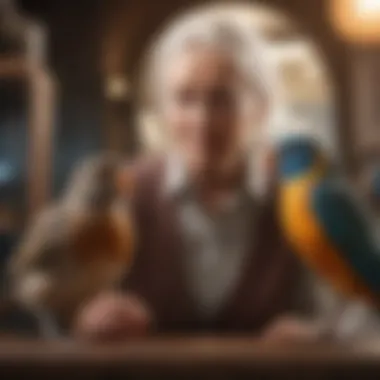
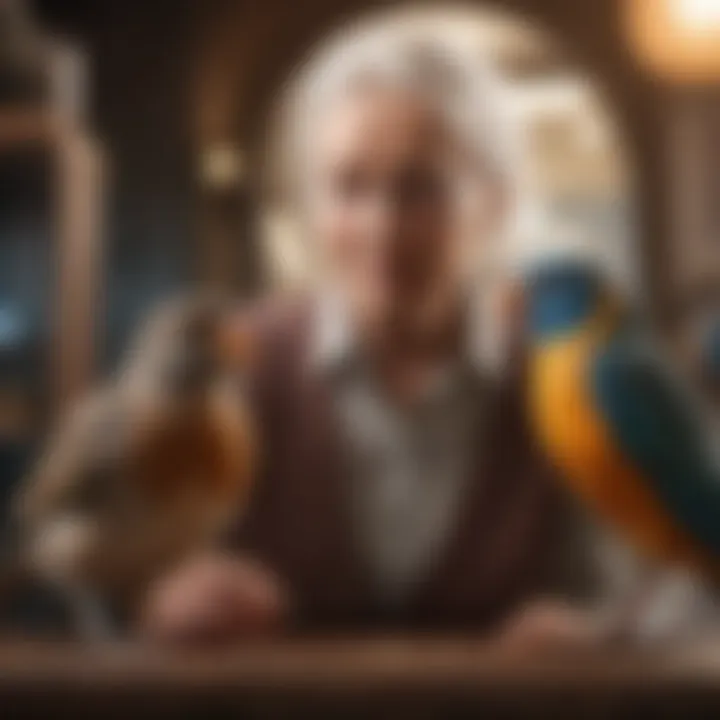
Keeping an eye on your bird’s behavior is critical. Subtle changes in demeanor might be indicators of illness. Signs such as lethargy, loss of appetite, or fluffed feathers are concerning and should prompt immediate consultation with a vet.
Being vigilant about these signs helps correlate changes in your pet’s responses, ensuring you’re ready to act when needed. Prompt action can often mean the difference between a minor issue and a serious health crisis.
Understanding Bird Behavior
Understanding the behaviors of pet birds is invaluable for anyone looking to forge a harmonious relationship with these creatures. Birds are not merely pets; they are intricately social beings with unique ways of interacting, both with their own kind and with humans. Recognizing their behaviors helps in enhancing the bond bird owners share with their pets while ensuring the animals' needs are met, contributing to their overall happiness and well-being.
Social Structures of Pet Birds
Hierarchy and Group Dynamics
When it comes to the social structures of pet birds, hierarchy and group dynamics play a pivotal role. Birds often establish a pecking order, which influences their interactions and relationships within a flock. For pet birds, understanding this dynamic can be crucial, especially in multi-bird households. The key characteristic of hierarchy is that it fosters a sense of security among the birds; they know their place within the social system.
One might think of this as a tightly knit community where each bird has its role, aiding in their mental stability. A flock with defined social roles minimizes conflict, as birds generally avoid aggression by adhering to their rank. However, if a new bird joins the mix, it might disrupt this established order, leading to potential stress or territorial disputes. On the flip side, social structures can enhance learning among birds, as they often mimic behavior from those in higher ranks. This mutual learning can be beneficial for owners looking to train their pets.
Human-Bird Interactions
Human-bird interactions are another critical aspect of understanding bird behavior. These interactions can range from simple companionship to more complex forms of communication. The key feature here is the ability of birds to bond with their owners, which is significantly beneficial for both parties. Birds that receive regular attention and affection from humans display greater trust and reduced anxiety levels.
For instance, when owners actively engage with their birds—speaking, training, and playing—they can create a strong emotional bond. This bond opens avenues for better understanding of the bird's needs and behaviors. However, it can also lead to dependency, where the bird becomes overly reliant on human interaction, potentially causing distress during times of absence. Engaging with pet birds thoughtfully can lead to a fulfilling companionship that respects their social needs.
Common Behavioral Traits
Vocalizations and Communication
Vocalizations and communication are among the most fascinating behavioral traits of pet birds. Birds have evolved a rich repertoire of sounds—from chirps to whistles—each serving a purpose, such as signaling danger or expressing affection. The key characteristic here is their ability to convey complex emotions through vocal sounds. This feature not only makes birds engaging pets but also helps owners gauge their mood and well-being.
Birds that vocalize frequently tend to be more social and interactive. Yet, excessive vocalizations may indicate stress or frustration, prompting owners to assess their pet's environment and social needs. As such, the ability to interpret these sounds is crucial for maintaining a happy habitat. Birds can also learn to mimic human speech, which can be entertaining but also highlights their social nature and desire for interaction.
Play Behavior
Play behavior is another trait that can’t be overlooked in pet birds. Playtime is not just leisure; it's fundamental for their mental and emotional health. The key characteristic of play behavior is its role in stimulating the bird’s mind, preventing boredom, and promoting physical health. Birds often engage in playful activities by swinging, climbing, or manipulating toys, which can be quite captivating to observe.
Having a variety of stimulating toys encourages birds to explore and engage also with their environment, facilitating natural instinctual behaviors. However, it’s essential for owners to monitor their pets during playtime. Some toys may have small parts that could pose choking hazards, or certain materials might not be safe. Overall, fostering playfulness in birds enhances their quality of life, leading to happier and healthier companions.
Legal Considerations in Australia
When it comes to pet ownership in Australia, the legal framework surrounding bird ownership plays a critical role. Understanding the regulations ensures that bird owners not only comply with the law but also contribute positively to conservation efforts. Ignoring these legalities could lead to hefty fines, legal troubles, and negative impacts on biodiversity.
Wildlife Protection Laws
Australia is home to a diverse range of native bird species, many of which are protected under various wildlife protection laws. These laws aim to mitigate the risks associated with habitat destruction, poaching, and illegal wildlife trade. The importance of these laws cannot be overstated, as they safeguard many bird species from extinction. For instance, should you desire to admire the beauty of a native Australian species, such as the Eastern Rosella or the Superb Lyrebird, keeping them as pets is strictly regulated.
- Native vs. Exotic: Native birds are often legally protected to prevent unregulated capture and trade. While some exotic species like the Cockatiel are commonly kept as pets, it’s essential to understand which native birds can be legally kept and under what conditions.
- Consequences of Violation: Ignoring wildlife protection laws can lead to severe repercussions. Individuals found to be housing protected species without the required permits may face hefty fines, or worse, the possibility of imprisonment. The emphasis on legal compliance is not only about personal responsibility but also about doing one's part in preserving Australia’s unique avian heritage.
Important: Always check with local authorities about the species you wish to own to ensure compliance with existing laws.
Permits for Bird Ownership
Navigating the permit system can be a daunting task for potential bird owners. However, obtaining the correct permits is crucial for a legal and ethical bird ownership experience. The process slightly varies from state to state, but there are common threads that all interested bird enthusiasts should be aware of.
- Types of Permits: Depending on the species, you might need different types of permits. For instance, a simple permit for exotic species like Lovebirds might suffice, whereas a more comprehensive wildlife license is necessary for certain native species.
- Application Process: To begin the application, an understanding of local regulations is vital. Often, this includes submitting detailed information about the bird’s origin and the owner’s capacity to care for it.
- Renewal and Compliance: Permit holders must keep track of renewal dates and remain compliant with any conditions attached to the ownership. Regular inspections might be part of maintaining compliance, ensuring that the pets live in suitable conditions and are being cared for properly.
- Community Resources: Organizations like the Australian National Wildlife Crime Coordinator and local avian clubs can provide guidance through the often complex permit process. Their expertise can be invaluable for making informed decisions about bird ownership.
Environmental and Ethical Considerations
When discussing pet birds, environmental and ethical considerations play a crucial role. This section delves into how bird ownership influences ecosystems, the ramifications of exotic bird trade, and the significant conservation efforts that aim to protect our feathered friends in their natural habitats. Understanding these aspects enriches our knowledge and awareness as responsible pet owners, ensuring we not only enjoy companionship but also contribute positively to wildlife preservation.
Impact of Exotic Bird Trade
The exotic bird trade is a delicate subject, interwoven with threads of ethical dilemmas and environmental implications. Each year, countless birds are captured from the wild and sold globally. This trade raises pressing concerns about biodiversity and the sanctity of natural ecosystems.
Choosing birds that are bred in captivity rather than those taken from the wild can significantly mitigate this impact. Many avian species are now endangered due to over-exploitation and habitat destruction, and as such, supporting captive-bred birds is vital. Here are some considerations:
- Biodiversity Loss: Introducing captive birds into wild populations can disrupt local ecosystems, leading to unforeseen consequences.
- Habitat Destruction: The demand for rare bird species may contribute to habitat degradation, as natural environments are manipulated for capture and trade.
- Ethical Breeding: It's imperative to research breeders and ensure they prioritize the welfare of their birds, providing suitable living conditions and responsible breeding practices.
Taking a stand against unethical practices not only helps protect individual species but also preserves the rich biodiversity that makes Australia a unique home for many avian organisms.
Conservation Efforts
Conservation of bird species is gaining traction, with several organizations leading initiatives aimed at protecting habitats and the birds that rely on them. In Australia, where avian diversity is immense, efforts vary from local community programs to large-scale international ventures. Some key aspects include:
- Habitat Restoration: Projects that focus on rebuilding local habitats where native bird populations can thrive. This includes planting native vegetation and restoring wetlands.
- Legal Protection: Increasing laws to protect endangered species and their habitats, ensuring that trading in these birds is regulated or prohibited.
- Public Education: Campaigns to raise awareness about the plight of wild birds, encouraging responsible pet ownership and the importance of biodiversity.
In the grand scheme, these conservation efforts not only aim to protect the birds themselves but also the environments that support them. It's an ongoing battle that calls for advocating measures that rock the boat of captivity and engage a community to drive change. By actively participating in or supporting these initiatives, owners can play a part in the greater preservation of wildlife habitats and the birds that inhabit them.
"Our love for birds should not come at the cost of their existence in the wild. Ethical choices make a difference."
In summary, being conscious of the impacts of the exotic bird trade and supporting conservation efforts can significantly guide responsible ownership. As pet birds share their vibrant lives with us, it’s our duty to balance that joy with the understanding that their wild counterparts need our protection.
Epilogue and Future Trends
Pet birds have carved a unique niche in many Australian households, not just as companions but as integral parts of family life. Their colorful personalities and engaging behaviors can provide joy and a sense of connection that speaks to many pet owners. However, as we delve into the landscape of bird ownership, it’s vital to recognize the evolving nature of this relationship and its implications for the future.
The Evolving Landscape of Bird Ownership
The dynamics of bird ownership in Australia are changing rapidly. Today, more people are becoming aware of the responsibilities tied to having a pet bird. The shift in societal attitudes towards animal welfare is fostering a community that values education and understanding over mere acquisition. This realization has led to an uptick in resources available for prospective and current owners alike.
In many ways, social media has played an outsized role in this transformation. Platforms such as Facebook and Reddit have become forums for sharing experiences and best practices. Enthusiasts connect over shared tips for training, diet, and health, thus lifting the veil on common challenges such as dealing with behavioral issues or providing proper environments.
Moreover, innovations in avian care products are becoming more accessible. From specialized cages to organic bird food, the market is now rich with options that cater to the needs of different bird species. This progress spreads awareness about the standards of care that can lead to healthier, happier birds. As more people embrace bird ownership, there is a push for policies that support the humane treatment of birds. This includes stricter regulations against illegal breeding and trading of exotic species, focusing on the welfare of birds and emphasizing responsible ownership.
Encouraging Responsible Bird Care
Nurturing a pet bird extends beyond feeding and housing; it involves fostering a respectful and understanding bond with these intelligent creatures. Encouraging responsible bird care should be a cornerstone of any bird ownership guide. Education plays a pivotal role here. Prospective owners need access to clear, reliable information regarding the specifics of bird care, including social needs, dietary requirements, and behavioral training. An ounce of prevention is worth a pound of cure; this adage rings especially true when it comes to bird health and happiness.
In addition, community involvement can make a significant difference in promoting responsible ownership. Local clubs and organizations can host workshops and seminars, offering hands-on experiences for bird owners to engage in best practices. These interactions not only forge bonds among bird enthusiasts but also help spread knowledge.
Lastly, responsible ownership is often shaped by acknowledgment of the lifelong commitment that birds represent. Unlike a casual pet, many bird species have long lifespans, some reaching 20 years or more. Thus, potential bird owners should be equipped to make thoughtful decisions about training, dietary needs, and daily attention.
"Birds are not just pets; they are companions who deserve attention, education, and love. Investing in their care is investing in a relationship that enriches all parties."















